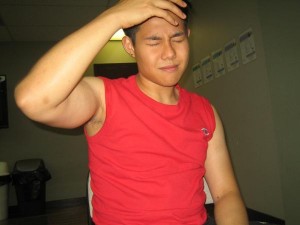Hypertension refers to high blood pressure and is commonly known as the ‘silent killer’. This is because even at very high blood pressures, the condition does not show any signs or symptoms except in some cases where people may experience mild headaches, nosebleeds or dizziness. The severity of high blood pressure increases without any notice to the casualty and increases the risk for major problems such as heart attacks and stroke.
Blood pressure indicates the amount of blood the heart pumps and the resistance of blood flow in the blood vessels. Your heart pumps blood so that blood is supplied to all parts of your body; the upper body and the lower body. Therefore, an adequate pressure is required to allow blood to reach these areas of the body. The aorta has the highest blood pressure which decreases as it’s channeled across smaller arteries and blood vessels.
How is blood pleasure measured?
You measure your blood pressure using a blood pressure cuff that will show you your blood pressure in two numbers, for example 120/80 mm Hg.
- Systolic pressure: The larger number indicates the pressure produced when the heart contracts or when it pumps. This is called the systolic pressure and records the pressure exerted on the arterial walls.
- Diastolic pressure: The smaller number shows the pressure recorded when the heart is resting and filling with blood between the heartbeats. This is called the diastolic pressure.
Blood pressure is classified into 5 different levels:
- Normal blood pressure: 120/80
- Pre-hypertension: 120-139/80-99
- Hypertension: above 140/90
- Stage 1 hypertension: 140-159/90-99
- Stage 2 hypertension: 160 and above/100 and above
It is vital that you monitor your blood pressure as untreated high blood pressure can cause severe problems such as kidney diseases, heart attacks and stroke. You can use a home blood pressure monitoring device to check your blood pressure. Allow your doctor to interpret the readings and do not try to treat or diagnose your condition yourself. If you show signs of high blood pressure or developing heart disease, your doctor may ask you to get a check-up done regularly.
Complications
If left untreated, high blood pressure can result in the following complications:
- Heart diseases: Coronary heart disease and cardiac arrhythmia
- Brain apoplexy: Hemiplegia and dementia
- Kidney problems and Renal failure: Uremia
Treatment and prevention
High blood pressure often runs in families and it is thus, genetic. However, you can reduce the chances of developing major problems lead by hypertension by following these lifestyle changes:
- Quit smoking
- Maintain a balanced, nutritious diet. If you are susceptible to heart disease due to high blood pressure, maintain a low-fat, low-cholesterol, low-salt and high-fiber diet
- Exercise regularly. Engaging your body (and heart) in physical activity can greatly reduce the chances of developing heart disease and keep you in good shape too. It is recommended that you exercise for at least 30 minutes every other day to reduce the risk for heart disease
- Take medications prescribed by your doctor
Become Prepared by Taking a Course
workplace approved training courses teach individuals basic recognition and emergency management skills to treat a variety of circulatory emergencies including hypertension. Register for any first aid course to learn more and receive “hands on” training. Click here to view available courses.
